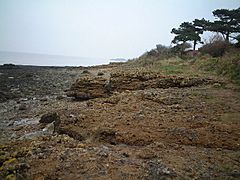Portishead Pier to Black Nore SSSI facts for kids
| Site of Special Scientific Interest | |
 |
|
| Area of Search | Avon |
|---|---|
| Coordinates | 51°29′48″N 2°45′33″W / 51.49668°N 2.75911°W |
| Interest | Geological |
| Area | 71.8 hectares (0.718 km2; 0.277 sq mi) |
| Notification | 1952 |
The Portishead Pier to Black Nore SSSI is a very special place near the town of Portishead in North Somerset. It covers about 71.8 hectares, which is like 100 football fields! This area was officially recognized in 1952 because of its amazing rocks and fossils.
Contents
What is a Site of Special Scientific Interest (SSSI)?
An SSSI stands for Site of Special Scientific Interest. It's a special protected area in the United Kingdom. These sites are chosen because they have rare wildlife, plants, or important geological features. Protecting them helps keep our natural world healthy and allows scientists to study them.
Amazing Rocks and Earth's History
The rocks at Portishead Pier tell a long story about Earth's past. The cliffs and shoreline here show some of the best examples of rocks from the Carboniferous Period. This period was about 359 to 299 million years ago!
Sandstone and Coal
You can see sandstones that were formed from sand carried by rivers. These rocks are part of the Upper Carboniferous period. They are important because they help us understand the Avonmouth Coalfield. This area once had lots of coal, which formed from ancient plants.
Mountain Building
The rocks also show signs of a huge event called the Variscan orogeny. This was a time when massive forces in the Earth pushed land together. It created huge mountain ranges, much like the Himalayas today. You can see how the rocks were folded and broken by these powerful movements.
Older Rocks: The Devonian Period
Even older rocks from the Devonian period are also found here. The Devonian period was even further back in time, from about 419 to 359 million years ago. These rocks are special because they contain fossils of ancient fish.
Ancient Fish Fossils
The Devonian rocks at Portishead Pier are famous for their fossil fish. Scientists have found several different kinds of fish fossils here. These fossils help us learn about what life was like millions of years ago.
Types of Fish Fossils
The most common fossils found are scales from a fish called Holoptychius. Imagine finding scales from a fish that lived before dinosaurs! Scientists also find teeth and scales from other ancient fish.
Armored Fish
Even more exciting are the plates from arthrodires. These were a type of ancient fish that had bony armor covering their heads and chests. One famous arthrodire found here is called Groenlandaspis. Finding these fossils is like finding pieces of a puzzle that tell us about life long, long ago.
 | James Van Der Zee |
 | Alma Thomas |
 | Ellis Wilson |
 | Margaret Taylor-Burroughs |

